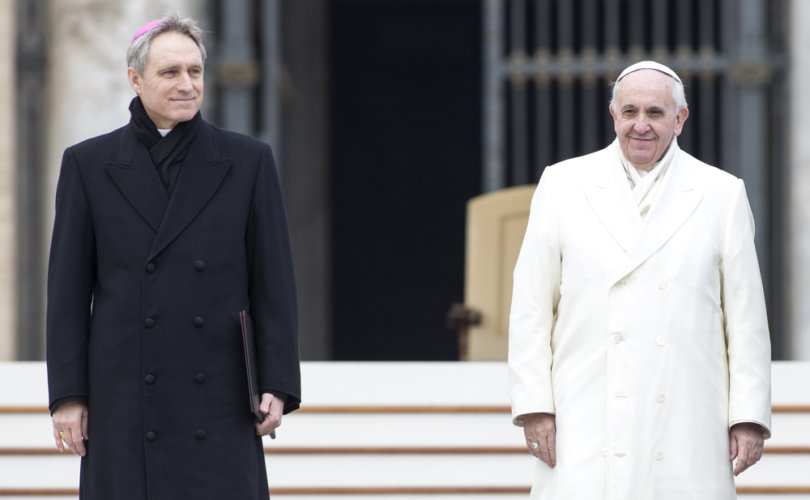VATICAN CITY, July 19, 2016 (LifeSiteNews) — Archbishop Georg Gänswein, Pope Emeritus Benedict XVI's long-time personal secretary, has given a sweeping interview in which he accuses his fellow German bishops of downplaying Catholic dogma, and insists that popes cannot change the Church's teaching with “half sentences or somewhat ambiguous footnotes.”
Gänswein, who also serves as Prefect for the Papal Household for Pope Francis, made his remarks in an interview published Monday in the Ravensburg newspaper Schwäbischen Zeitung.
“Considering the baselines of their theological convictions, there is definitely a continuity” between Benedict and Francis, Gänswein said, according to a Catholic News Agency translation.
“Obviously, I am also aware that occasionally doubt might be cast on this, given the differences in representation and expression” between the two men, he added.
“But when a pope wants to change an aspect of the doctrine, then he has to do so clearly, so as to make it binding,” noted the 59-year-old archbishop, a canon lawyer who formerly worked in the Congregation for the Doctrine of the Faith.
“Important magisterial tenets cannot be changed by half sentences or somewhat ambiguous footnotes,” he said, in an apparent reference to the controversy over Amoris Laetitia.
Gänswein conceded that Pope Francis has “a way of speaking that can at times be somewhat imprecise, indeed flippant,” and noted that “statements that can be interpreted in different ways are a risky thing.”
But even if his statements “lead to bizarre interpretations,” Pope Francis is not likely to change, Gänswein said. “Every pope has their own personal style.”
In the interview, he also strongly criticizes the German hierarchy for “effectively excommunicating” Catholics who opt out of the state-mandated church tax while remaining unconcerned that members of their flock question the Church’s dogmas.
The German bishops’ expectation that the “Francis effect” would lead Catholics back to Church “appears to have not transpired.”
In fact, statistics released July 15 show the Catholic Church in Germany in steep decline, with 181,925 Catholics recorded as leaving in 2015, and fewer than 10,000 returning or joining. Despite about 167,000 infants baptized, the church had a net loss, according to Catholic News Service.
Gänswein, the eldest son of a blacksmith from the village of Wald in the Black Forest region, blasted the German bishops for regarding payment of the state Church tax as the basis for membership in the Catholic Church.
When a German registers as a member of a particular church — Catholic, Protestant, Jewish — the government collects the tax, which amounts to about eight percent to nine percent of an individual’s total income tax, or three to four percent of his salary, and distributes this to the religious community.
The Church receives about 70 percent of its income from the Church tax, and with revenues of $6.71 billion in 2013, it has become “one of the wealthiest entities, faith-based or otherwise, in the world,” according to a 2015 analysis by the National Catholic Register’s Edward Pentin.
Anyone who wants to opt out of the church tax “must declare his departure from the church to which he belongs, whether Catholic or Protestant, by a public act made before a competent civil authority,” explains Vatican watcher Sandro Magister. Many Germans unregister to avoid the tax but continue to attend Mass and pay private tithes.
Despite the declining number of members, the Catholic Church received an estimated income of 6.64 billion USD in 2015 because of Germany’s robust economy.
Gänswein echoed concerns Pope Benedict has repeatedly voiced when he agreed with interviewer Hendrik Groth that Catholics who opt out of paying the tax are “effectively excommunicated.”
“Yes, that is a serious problem,” the archbishop responded. “How does the Catholic Church in Germany react to someone leaving? By automatic expulsion from the community, in other words, excommunication! That is excessive, quite incomprehensible.”
Added Gänswein: “You can question dogma, no one is concerned about that, no one gets kicked out. Is the non-payment of the Church tax a bigger offense against the faith than violations of the tenets of faith?”
He said the impression that this system creates “is this: As long as the Faith is on the line, that is quite acceptable. However, when money enters the equation, things get serious.”
Gänswein said he doesn’t have “any ambition” to be appointed to a German diocese in the future, and it would be unlikely in any case, given that the diocesan cathedral chapters are instrumental in making episcopal appointments in Germany, and they are not known for having the “highest loyalty toward Rome.”
Moreover, Gänswein said as far as the Catholic Church in Germany is concerned, his past work with the CDF and current position as Pope Benedict’s personal secretary would likely be regarded as “the mark of Cain.”

